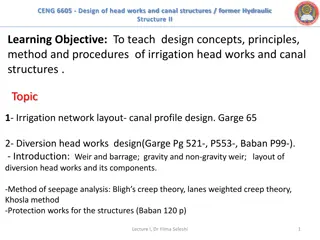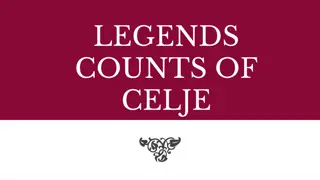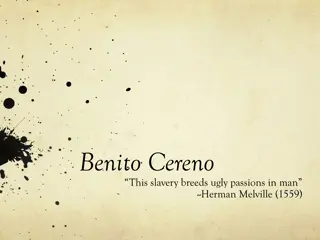The Life and Works of Herman Melville
Herman Melville (1819-1891) was an American novelist and poet known for masterpieces like "Moby-Dick." His adventurous life at sea greatly influenced his writing, offering insights into the limits of human knowledge and the complexities of nature.
Download Presentation

Please find below an Image/Link to download the presentation.
The content on the website is provided AS IS for your information and personal use only. It may not be sold, licensed, or shared on other websites without obtaining consent from the author. Download presentation by click this link. If you encounter any issues during the download, it is possible that the publisher has removed the file from their server.
E N D
Presentation Transcript
Herman Melville Herman Melville (born Melvill August 1, 1819 September 28, 1891) was an American novelist, short story writer and poet of the American Renaissance period. Among his best- knownworksishismasterpiece, Moby-Dick(1851),andTypee (1846). Melville's father supported his seven children importing French dry goods, but in 1830 he decided to try his luck in the fur business in Albany, NY. Within two years, the family was bankrupt and Herman's father died suddenly. Melville and his siblings left school to work in the family fur and cap business, with Melville working several other jobs as well -- filling in teachingpositionsatlocalschools,workingonhisuncle's farm,andclerkinginalocalbank. Despite these difficulties, Herman Melville read extensively on his own, consuming mythology, anthropology, and history. He was fascinated with Shakespeare's poetic devices and their ability to capture an audience. He was also raised hearing the thrilling story of the whaleship Essex, American Whaler, which was attacked by a whale and sunk whenMelvillewasjust ayear old.
In 1839, at the age of 20, Melville took his first voyage across the Atlantic sea as a cabin boy on the merchant ship the St. Lawrence. After this expedition and a year exploring the West, Melville joined the crew of the whaling ship Acushnet in January of 1841. The thrilling, exciting, adventure that occurred during the next three years would full his desire for excitement and provide him with his material forhis first three novels. After a year and a half aboard the Acushnet, Melville and a fellow seaman deserted the ship, only to be captured by cannibals in the Marquesas Islands, theTypee.
On the Lucy Ann Melville traveled to Tahiti, where his unusual journey continued when he, along with the crew, committed mutiny byrefusing their duty. he joined the crew of whaler CharlesandHenry, where he worked asharpooner. In August, 1843, Melville enlisted in the US Navy working as a seaman on the Navy ship UnitedStates through the Pacific. In October 1844, Melville returned to his mother's house determined to write about his adventures. His subsequent writings borrowed from his own experiences as well as other peoples' fantastic stories that he heard during his travels. Because of his extensive experience as a seaman and a whaler, his descriptions of life out at sea were comprehensive and accurate. Melville was also able to communicate the fear and terror of a whale hunt, a feat that would make his greatest work, Moby Dick, a literary tribute tothe whaling industry.
Themes The Limits of Knowledge As Ishmael tries, in the opening pages of Moby-Dick, to offer a simple collection of literary excerpts mentioning whales, he discovers that, throughout history, the whale has taken on an incredible multiplicity of meanings. Over the course of the novel, he makes use of nearly every discipline known to man in his attempts1. to understand the essential nature of the whale. The multiplicity of approaches that Ishmael takes, coupled with his compulsive need to assert his authority as a narrator and the frequent references to2. the limits of observation (men cannot see the depths of the ocean, for example), suggest that human knowledge is always limited and insufficient. When it comes to Moby Dick himself, this limitation takes on allegorical significance. 3. The ways of Moby Dick, like those of the Christian God, are unknowable to man, and thus trying to interpret them, as Ahab does, is inevitably futile andoften fatal
The Deceptivenessof Fate Ishmael s narrative contains many references to fate, creating the impression that the Pequod s doom is inevitable. Many of the sailors believe in prophecies, and some even claim the ability to foretell the future. A number of things suggest, however, that characters are actually deluding themselves when they think that they see the work of fate and that fate either doesn t exist or is one of the many forces about which human beings can have no distinct knowledge. Ahab, for example, clearly exploits the sailors belief in fate to manipulate them into thinking that the quest for MobyDickis their commondestiny.
The Exploitative Nature ofWhaling At first glance, the Pequod seems like an island of equality and fellowship in the midst of a racist structured world. The ship s crew includes men from all corners of the globe and all races who seem to get along harmoniously. Ishmael is initially uneasy upon meeting Queequeg, but he quickly realizes that it is better to have a sober cannibal than a drunken Christian for a shipmate. Additionally, the conditions of work aboard the Pequod promote a certain kind of egalitarianism, equality, since men are promoted and paid according to their skill. However, the work of whaling parallels the other exploitative activities buffalo hunting, gold mining, that characterize American and European territorial expansion. Each of the Pequod s mates, who are white, is entirely dependent on a nonwhite harpooner, and nonwhites perform most of the dirty or dangerous jobs aboard the ship. Flask actually stands on Daggoo, his African harpooner, in order to beat the other mates to a prize whale. Ahab is depicted as walking over the black youth Pip, who listens to Ahab s pacing from below deck, and is thus reminded that his value asaslaveis less than the value of awhale.
Defiance, challenge Because of the dominance of Ahab's quest in the novel, the theme of defiance is of paramount importance. Father Mapple prepares us for a consideration of defiance with his sermon about Jonah in Chapter 9. Jonah suffers from the sin of disobedience. When God asks him to submit to God's will, Jonah attempts to flee from god. He thinks that he can find some country where God does not rule. What he learns is that he must set aside his ownwishes, his ownvanity, if he is to followGod's way. Father Mapple puts it like this: "And if we obey god, we must disobey ourselves; and it is in this disobeying ourselves, wherein the hardnessofobeyingGodconsists."
Whether he is fighting against God or the rules of nature or some sort of perverse evil authority, Ahab is a defiant man. After Starbuck suggests that it is "blasphemous" to seek revenge on some poor dumb brute, such as a whale, when it merely followed instinct and took off the captain's leg, Ahab responds that he would "strike the sun if it insulted me . Ahab explains that he is not seeking revenge against a mere whale. He sees the White Whale as a mask, for his real enemy, which is an authority that rules over Ahab and which Ahab refuses to accept. The nature of that authority is debatable. We might infer that it is the order of nature, which Ahab sees as evil because Ahabinsists onbeing placed higher innature thana mere mancanbe.
Certainly Ahab is mad; even he knows that his monomaniacal obsession is not "normal." But he strikes us as not being a man who would want to be normal. Ahab strikes back against the inscrutable figure behind the mask because Ahab sees no justification for submitting to it. He rebels with anger because he wants to be more than he is. Ahab defies whatever authority there is and stands against it with a soul that can be killed but not defeated. In that sense, he condemns himself to death; but it is a death that he prefers to submission. In his madness and egocentrism, tragically, he takes his ship andmostofhis crewwith him.
Friendship In contrast to Ahab's self-centered defiance is the theme of friendship, or camaraderie, which is characterized primarily through Ishmael and Queequeg. The two meet under awkward circumstances. As a result of a shortage of beds at the Spouter-Inn, as well as the mischievous nature of the proprietor, Queequeg and Ishmael find themselves in a frightening situation. Ishmael has no idea that his bunkmate is a "heathen" and concludes that the one who enters the room late is a cannibal. Queequeg doesn't even know he is to share his bed with anyone and does threaten Ishmael's life. It's not an auspicious beginning for a friendship, but things soon get better because both men are open to the positive possibilities of diversity. They are characters who can and do grow and change. Queequeg left his native island of Kokovoko to learn about the rest of the world. Ishmael has similar motives for his ventures. Both understand that people from different cultures can learn from each other, and both value their differences as well as their similarities. An example is their respect for each other's religion. Although Queequeg is no Christian, he does attend services at the Whaleman's Chapel in New Bedford. Later, Ishmael bonds with Queequeg by sharing a pipe of tobacco and later making aburnt offering toQueequeg's little idol,Yojo.
Although it is not investigated in detail, this kind of friendship is also somewhat true of the crew of the Pequod, which is a microcosm of life from various cultures. Ishmael alludes to the camaraderie as he describes working whale blubber with the other men. Unfortunately, there are exceptions aboard ship. Stubb is one. His scene with the black cook, Fleece, may have been designed for humor; but it seems more like an illustration of the absence of brotherhood. The gams with other ships do provide positive opportunities for camaraderie. Significantly, Ahab has almost no interest in friendship. He eventually banishes the one person, Pip, who begins to get close to him.Ahab's mission allows fornoneofthe warmth offriendship.
Duty Because most of the action of the novel takes place aboard ship, it is not surprising that duty is a major theme in Moby-Dick. The problem is how it is to be interpreted. For Father Mapple, the first duty of any shipmate is to God. We can serve our professional obligations only within that larger value system. This is not the case with Ahab. After Ahab's initial disagreement with Starbuck on the quarter-deck regarding the ship's mission, the crew sees Ahab as its highest authority. Later in the voyage, Ahab and Starbuck have another confrontation,again concerningduty, in the captain's cabin
Starbuck is a sincere Quaker with a hierarchy of loyalties: He feels a duty first to God, then to his employer (who supports Starbuck's family), then to his captain. When Starbuck discovers that some of the barrels in the hold of the ship must be leaking oil, he reports the situation to Ahab. The first mate expects the captain to stop the ship and turn all hands to a check of the casks because the ship's official mission is tocapture whale oil and bring it home safely. As he says, "What we come twenty thousand miles to get is worth saving, sir." Ahab sardonically responds, "So it is, so it is; if we get it." Starbuck means the oil; Ahab means the White Whale. Starbuck reminds Ahab of the owners' interests, but the captain could not care less about the owners. He points a loaded musket toward the first mate and declares that there is "one Captain that is lord over the Pequod." Starbuck returns to the deck, and Ahab soon decides it is more prudent tostopthe ship andmake repairs.
It is clear, however, that the captain feels only one duty on this mission, and that is not to the owners or even to God but to Ahab. He will pursue his own monomaniacal goal in defiance of whatever gets in his path. The only way to stop Ahab is to kill him. When Starbuck has an opportunity to shoot the old man, with the same musket that Ahab pointed at him, the duties become confused in the first mate's mind. He has a duty to his family. How is that duty best served? He has a duty to the men who may well die with Ahab. But Starbuck feels a higher duty to himself, to God, perhaps simply to decency. He is unable to pull the trigger, not through weakness but due to his own system of values. Because Starbuck cannot kill his captain, he must serve him.
Death Although it does not dominate until the end, the theme of death casts an ominous shadow over the novel. Contributing to the theme of death, and foreshadowing events later in the novel, the subject seems to be a ship foundering in a terrible storm and under attack from a whale. The inn's proprietor is named "Coffin," contributing symmetry to a book that begins andends with a coffin.
The Pequod's voyage is a voyage to death, and the prophecies in the novel all anticipate it. Elijah, a prophet of doom, cryptically warns of dark endings before the ship sails. The Shaker prophet aboard the Jeroboam, who calls himself Gabriel, predicts that Ahab will soon be joining the dead at the bottom of the sea. Fedallah's prophecy is most elaborate as he details events leading up to and including Ahab's death.The Parsee's predictions all cometruein unexpectedways. The novel endsin death forall butthe narrator, Ishmael

 undefined
undefined
























